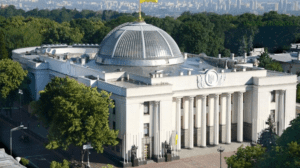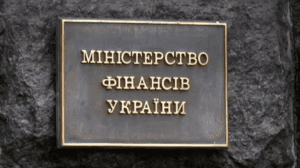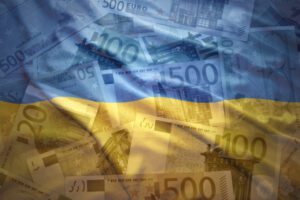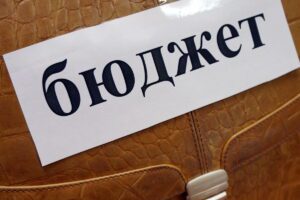Structure of approved state budget income for 2023

CMU

The Verkhovna Rada adopted the law “On the State Budget of Ukraine for 2023”, said MP Yaroslav Zheleznyak (Voice faction). “Parliament adopted the State Budget for 2023 in the second reading and in general,” he wrote in the Telegram channel on Thursday. According to Zheleznyak, 295 people’s deputies supported the budget for the next year, 35 abstained, and no one voted against.
The votes were distributed as follows: the Servant of the People faction – 211, the Voice – 10, the Platform For Life and Peace groups – 18, For the Future – 15, Trust – 16, Restoration of Ukraine – 15 , non-fractional – 10.
The factions “European Solidarity” and “Fatherland” did not give a single vote in support of the state budget.
“Now we hope that international partners will appreciate our punctuality and fully finance the pledged … deficit of $ 38 billion,” Zheleznyak wrote.
As reported, on November 2, the Parliamentary Budget Committee positively assessed the government’s finalization of the draft state budget of Ukraine for 2023, noted its agreement with the International Monetary Fund and recommended that the Verkhovna Rada adopt it in the second reading and as a whole.
The Committee proposed to increase spending on covering the activities of the Verkhovna Rada by UAH 120 million, on parliamentary control over the observance of constitutional human rights and freedoms – by UAH 96.56 million, on financing the statutory activities of political parties – by UAH 519.39 million, on events related to with the privatization of state property – by UAH 38.5 million.
In addition, it was proposed to additionally allocate UAH 62.76 million to the Specialized Anti-Corruption Prosecutor’s Office and UAH 16.38 million to the National Corruption Prevention Agency, all of this by reducing the Reserve Fund.
The Budget Committee recalled that in the draft state budget finalized for the second reading, revenues were increased by UAH 50.1 billion (or 3.9%), incl. for the general fund – by UAH 26.5 billion; expenses – by UAH 66.8 billion (or 2.7%), incl. for the general fund – by UAH 43.2 billion.
In addition, the deficit in the general fund was expanded by UAH 16.7 billion (or 1.3%) due to the same additional attraction of external financing – up to UAH 1 trillion 442.9 billion in total. “Thus, it is proposed to set the limit of the state budget deficit at the level of 20.6% of the forecast GDP (increased by 0.6 percentage points compared to the draft law submitted for the first reading),” the committee said, noting the significant risks of not receiving such loans.
As the deputies pointed out, the maximum amount of public debt at the end of 2023 was increased to UAH 6 trillion 422.7 billion, which is 102.3% of the forecast GDP (+2.2 percentage points to the bill submitted for the first reading).
When preparing the draft state budget for 2023 for the second reading, the forecast GDP growth was reduced to 3.2% from 4.6% and inflation to 28% from 30%. As a result, the revised forecast of nominal GDP is UAH 6 trillion 279.3 billion instead of UAH 6 trillion 399 billion.
“At the same time, the explanatory note to the finalized bill notes that more optimistic expectations of financial support from international partners, which will help support the balance of payments, led to an adjustment in the assumptions regarding the hryvnia exchange rate against the US dollar at the end of 2023 – UAH 45.8 / $1 (previous forecast – UAH 50 / $1), while its average annual value remains unchanged (forecast – UAH 42.2 / $1),” the committee said.
He added that the forecast of funds transferred by the NBU has been increased by UAH 51.6 billion and it is envisaged that such funds will be credited 50% each to the general and special funds, while in the bill submitted for the first reading – in full to the special fund. This growth made it possible to additionally allocate UAH 16.1 billion to the Fund for the Elimination of the Consequences of Armed Aggression, increased to UAH 35.5 billion.
Among the main changes for the second reading, the committee singled out an increase in pension spending by UAH 38.9 billion; production and broadcasting of television and radio programs for state needs – by UAH 1.4 billion; the judiciary – by UAH 1.3 billion (including the State Judicial Administration – by UAH 1.1 billion, the Supreme Court – by UAH 245.4 million, the High Council of Justice – by UAH 25.5 million), as well as increase in transfers to local budgets – by UAH 2.519 billion, mainly for social and economic development.
In total, revenues in the draft state budget-2023 finalized by the government for the second reading amount to UAH 1 trillion 329.3 billion, incl. for the general fund – UAH 1 trillion 173.1 billion, expenses – UAH 2 trillion 580.7 billion, incl. for the general fund – UAH 2 trillion 296.5 billion, the maximum deficit – UAH 1 trillion 296.5 billion, incl. for the general fund – UAH 1 trillion 124.6 billion.
The living wage is UAH 2589, the minimum wage is UAH 6700.

The state budget of Ukraine for January-October 2022 was executed with a deficit of UAH 638.7 billion, including the general fund – UAH 643.4 billion against the deficit of UAH 1,121.6 billion planned by the general fund for January-October 2022 hryvnia, said the Ministry of Finance.
“In October, the actual deficit of the state budget amounted to UAH 143.4 billion, including the general fund – UAH 147.1 billion,” the agency said in a release on Tuesday.
According to the operational information of the State Treasury, as indicated by the Ministry of Finance, in January-October 2022, the cash expenditures of the state budget amounted to UAH 1,978.6 billion, including the general fund – UAH 1,817.4 billion, or 86.4% of the list of the reporting period .
“At the same time, in October 2022, cash expenditures of the state budget were made in the amount of UAH 231.7 billion, including the general fund in the amount of UAH 222.5 billion,” the Ministry of Finance specified.
According to him, the income of the general fund in October amounted to UAH 72.8 billion.

Financial support commitments undertaken by Ukraine’s partners and the actual allocation of funds are still very different, which creates a liquidity problem and the threat of further monetary financing of the state budget deficit by the National Bank with all the negative consequences for inflation, exchange rate and macro stability, Finance Minister Sergei Marchenko said.
“You know perfectly well that there is a huge difference between commitments and payments… The first quarter of 2023 is the most problematic for us right now… Even a huge amount of commitments will not help us in the first quarter of 2023 (if these funds are not provided),” he said in Wednesday at the discussion “War in Ukraine: Financing the Victory” organized by the think tank Bruegel.
The day before in Berlin, at the International Expert Conference on the Reconstruction of Ukraine, the minister said that Ukraine’s fiscal and quasi-fiscal financing needs in the first quarter of 2023 are estimated at $11.4 billion. Of these, $4.2 billion is for gas purchases: January – $1.9 billion, February – $1.4 billion and March – $0.9 billion.
In total, the financing needs are: January – $4 billion, February – $4.1 billion and March – $3.3 billion, the Finance Minister’s presentation said. According to it, in the remaining months of 2023, they are estimated from $2.1 billion in August to $3.9 billion in June, for a total of $37.9 billion.
Marchenko recalled that in April 2022, it was agreed with international partners that the monthly gap in Ukraine this year is estimated at $5 billion a month, but the actual payment of funds is far from this figure. “For example, in April there were only $1.7 billion, in May – only $1.5 billion, in June – $4.4 billion, in July – $1.7 billion, in August – $4.7 billion, in September – about $2 billion.” , – stated the head of the Ministry of Finance.
According to him, if by the end of this year the EU’s macro-financial assistance (about EUR3 billion – IF) and the funds announced by the United States ($7.5 billion – IF) are allocated, then the Ministry of Finance will feel comfortable.
“But again, this does not mean that we will be able to cover all our expenses before the end of the year. It only means that we can manage the liquidity gap … we are able to meet critical expenses, while other expenses can be deferred,” Marchenko said.
He recalled that for 2023, the Ministry of Finance estimates the need for additional external financing of socially necessary budgetary spending in the amount of $3-3.5 billion, excluding emergency recovery costs, the likelihood of an increase in the background of the latest record Russian strikes on civilian infrastructure.
According to the minister, the commitments to allocate EUR 1.5 billion per month by the European Union in 2023 and EUR 18 billion in total for the year, which were taken the day before by the President of the European Commission Ursula von der Leyen, make it possible to assume a solution to this problem.
“But again, it is important for us to plan ahead. It is not yet clear whether we will be able to use this money in the first quarter of 2023,” Marchenko said.
He said that he discussed this issue at a meeting with the Minister of Finance of Germany, with the ministers of other countries.
“If you are ready to support Ukraine, please do it faster, because while you spend some time creating a solution, we do not have time. January is just around the corner, and January is not covered,” the head of the Ministry of Finance stressed.
He added that he expects to be connected to US funding. “But again, it’s not clear to me when the money can be paid, and if not, we have to find other options, we’ll look at another perspective, perhaps with bilateral creditors, etc. That’s why predictability is so important,” Marchenko added.

The government of Ukraine plans to attract $37.9 billion to finance the state budget deficit and $13.6 billion for restoration, the largest contribution is expected – $18 billion and $6.5 billion respectively – from the United States through USAID, such data are given in the presentation of the project state budget-2023.
According to information on the website of the Ministry of Finance, it is assumed that assistance from the United States will be monthly: for the budget – $1.5 billion, and for recovery – from $0.4 billion to $0.6 billion.
The second most important source of budget financing in the presentation is the IMF – $ 15 billion: $ 2 billion each in January, February and September, $ 1.6 billion in June, $ 0.6 billion – in August and from $ 0.8 to 1.1 billion – in the rest months.
As for macro-financial assistance from the EU and other sources, it is expected to be restored in the amount of $7.1 billion – monthly at $0.6 billion, except for $0.5 billion in December. While state budget funding from this source is projected at $4.9 billion: $1.9 billion in the first quarter, $1.3 billion in the second, $0.2 billion in the third and $1.3 billion in the fourth.
Finance Minister Serhiy Marchenko specified that this year, as part of negotiations with international partners, Ukraine has already received $19 billion in financial support, of which almost 50% is grant funds.
“By the end of the year, we plan to raise about another $17 billion in additional funding,” he said, presenting the draft state budget in the Rada on Wednesday.

The project of Ukraine, a warring country, for 2023 was developed by the Ministry of Finance and supported by the Cabinet of Ministers, said Finance Minister Serhiy Marchenko.
“The 2023 state budget is the budget of a country that will become stronger, strengthen its defense capabilities, be able to recover from the damage caused by Russian armed aggression, and also take care of citizens in need,” he wrote on Facebook on Tuesday.
According to the Budget Code, the government must submit the draft state budget to the Verkhovna Rada by September 15.